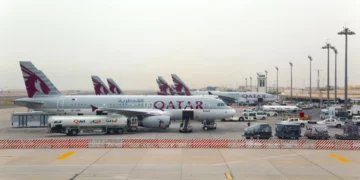Korean Air will utilise sustainable aviation fuel (SAF) between Paris and Seoul Incheon. The airline stated that it would inhibit greenhouse gas emissions by around 80% via this fuel medium.
The endeavour will be the airline’s initiative towards sustainable aviation, which is employing sustainable aviation fuel on its Paris Charles de Gaulle – Seoul Incheon route.
The South Korean firms strive to inhibit their greenhouse gases, and this new variety of fuel would cut down emissions by close to 80% from the manufacturing to consumption operation.
However, Korean Air stated that the new-fangled sustainable aviation fuel price is two to five times bigger than the traditional aviation kerosene.
Fabricated from waste and more environmentally friendly materials, sustainable aviation fuel does not utilise fossil fuels and can be combined with jet fuel to diminish carbon emissions.
Korean Air examined a route from Chicago (USA) to Incheon (Korea) with a sustainable aircraft fuelled aeroplane once in November 2017.
In 2021, it authenticated an MoU with Hyundai Oilbank to set up the basis for biofuel utilisation to propel aircraft.
The airline has bought carbon-neutral fuel for domestic courses from SK Energy and collaborated with Incheon International Airport Corporation, Airbus, and Air Liquide to assist the supply of hydrogen and the advancement of infrastructure.
Korean Air is brainstorming to unfold several preventive measures for emissions reduction and respond to climate change as a facet of the ESG drive.
Sustainable aviation fuel (SAF)
Sustainable aviation fuel is produced from sustainable feedstocks and is closely comparable in its chemistry to conventional fossil jet fuel. Utilising SAF results in an inhibition in carbon emissions compared to the traditional jet fuel it replaces over the fuel’s lifecycle. Typical feedstocks utilised are cooking oil and other non-palm waste oils from plants and animals, solid waste from homes and businesses, and food waste that would otherwise go to landfills or burning furnaces. Other potential resources include waste wood and energy crops from forests, swiftly maturing plants, and algae.
Why is sustainable aviation fuel essential?
Traditional jet fuel induces tremendous energy for its weight. It is this energy density that has allowed commercial flight. At present, there aren’t any other suitable options for transportation and logistics groups that have to cover long distances. Hence, the dependence on such fuels in aviation.
A return flight betwixt London and San Francisco releases nearly 1 tonne of CO2 for every economy ticket. With the aviation sector estimated to double to more than 8 billion passengers by 2050, we must cut down carbon emissions from the aviation sector. SAF is one way to go about and achieve this necessity.
How much carbon does sustainable aviation fuel save?
SAF gives a whopping reduction of around 80% in carbon emissions over the lifecycle of the fuel in comparison to the conventional jet fuel that it substitutes. However, depending on the feedstock that is procured for production, the reduction ratio varies.
Is it safe to utilise SAF?
SAF can be mixed at up to 50% with traditional jet fuel and all quality tests are accomplished just like conventional jet fuel. The mix is then re-certified as Jet A-1 or Jet-A. It can be handled similarly to traditional jet fuel. Hence, no renovations are needed in the fuelling infrastructure or for an aircraft to utilise SAF.
About Korean Air
On March 1st 1969, Korean Air began as a small airline in Asia with merely eight planes. Since then, the airline has strived to expand into new-fangled markets and enhance consumer service via constant changes and investments.

















